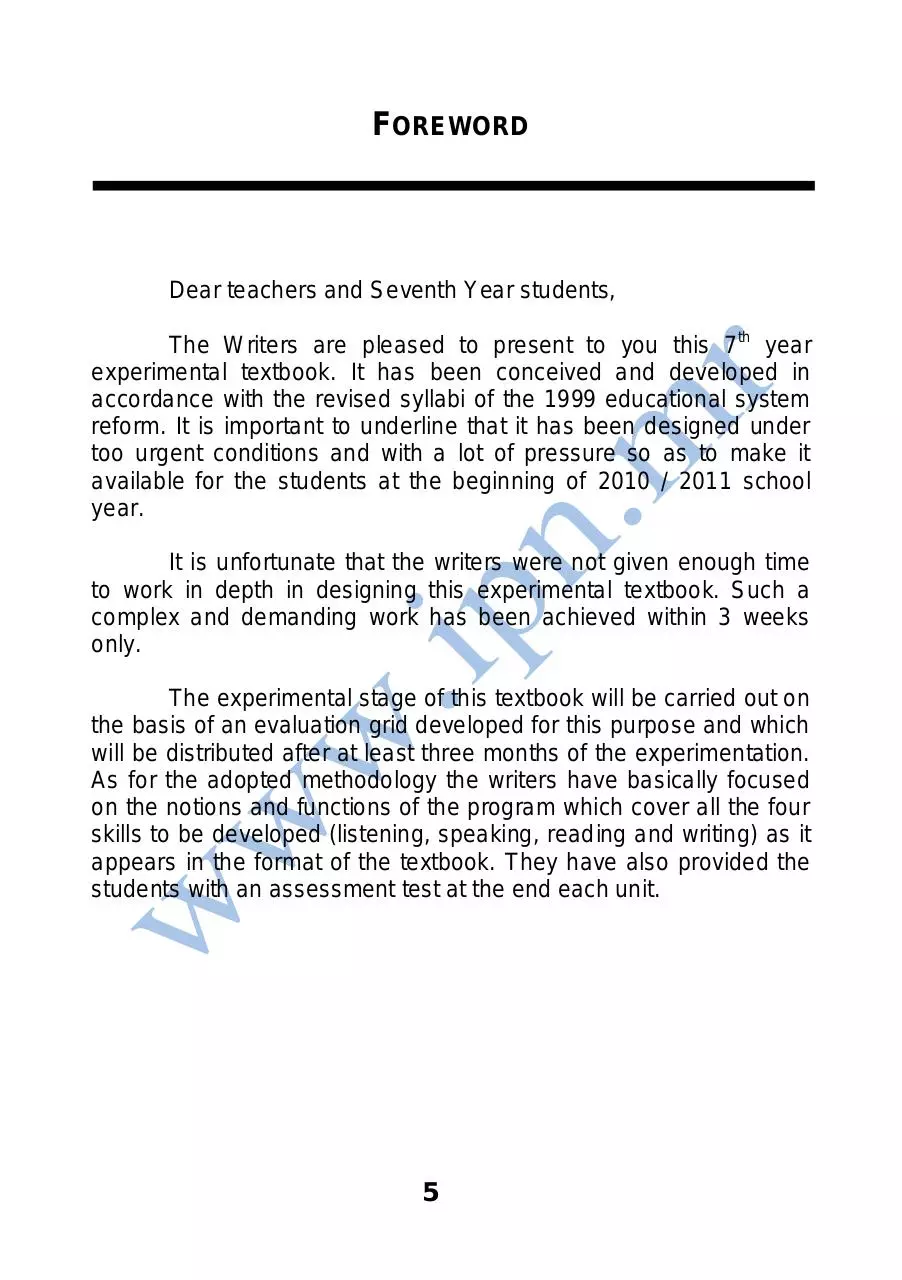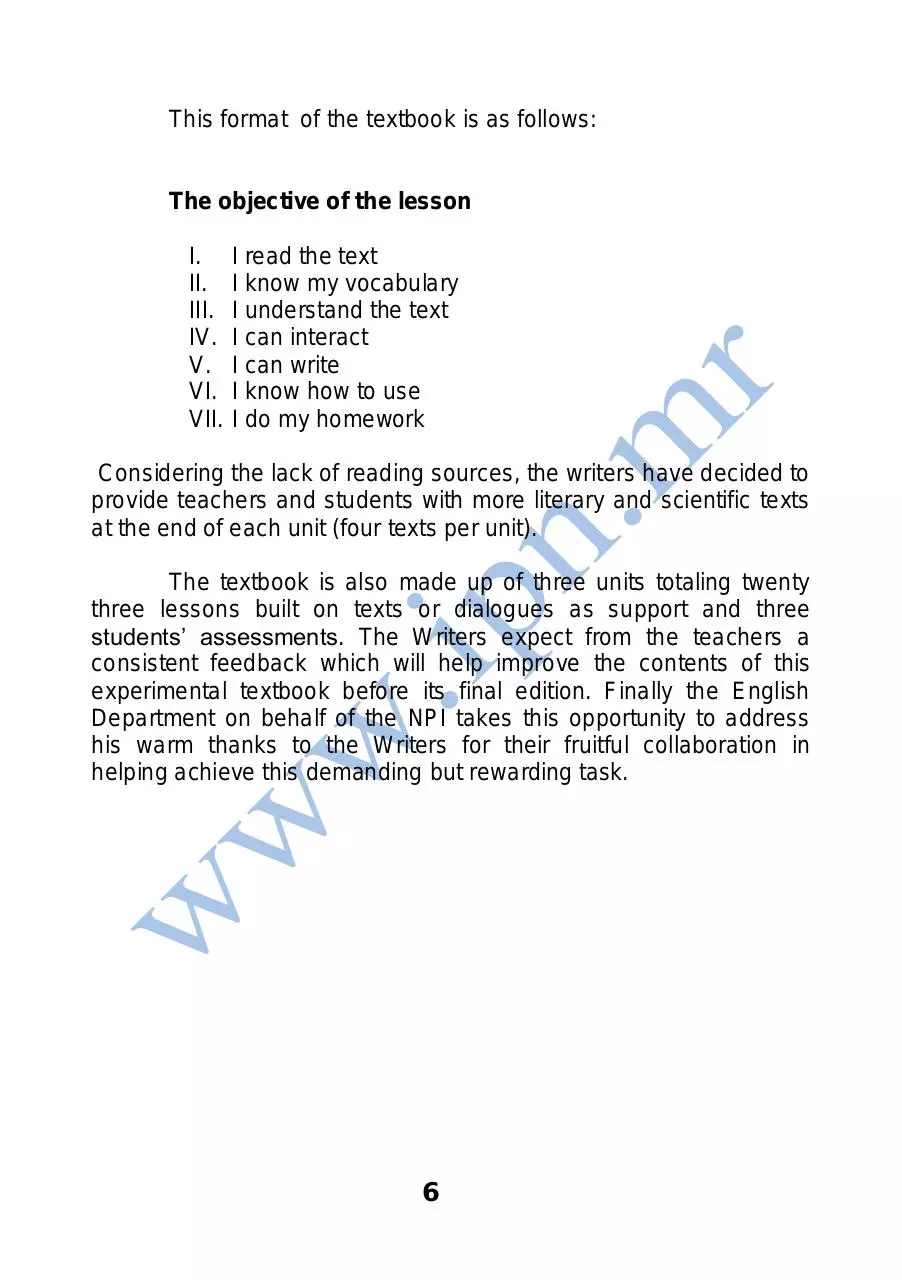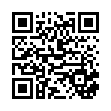engbook (PDF)
File information
Title: MergedFile
Author: Islim
This PDF 1.5 document has been generated by Microsoft® Office Word 2007 / 3-Heights(TM) PDF Merge Split API 4.9.17.0 (http://www.pdf-tools.com), and has been sent on pdf-archive.com on 28/09/2017 at 21:39, from IP address 197.231.x.x.
The current document download page has been viewed 1078 times.
File size: 3.13 MB (135 pages).
Privacy: public file





File preview
STUDY ENGLISH
STUDENT'S BOOK
7th Year Secondary School
(Expérimental stage)
The Writers:
- Diallo Harouna English Dpt. Coordinator (IPN)
- Layite Dieng Pédagogic Advisor English Dpt. (IPN)
- Mahjoub Abba Ould Mahjoub. Advisor English Dpt. (IPN)
Reviewed by:
- Mohamed Fadel Ould Cheïkh Elbou
English Teacher Dpt. (IPN)
Table of contents
Unit
Lesson
Number
Lesson title
one
two
three
Foreword
01
The sporting spirit
02
Beggary in Nouakchott
03
Technology
04
Prestigious international trophies
05
Force-feeding in Mauritania
06
The Independence Day in Mauritania
07
Going abroad
A1
Unit one student’s assessment
Supplementary texts for extensive reading
08
Making Mauritanian tea
09
The Nomad’s way of making bread
10
The signalman
11
A foreigner in New York
12
Solar energy
13
Another day in Paradise
14
Our new principal’s philosophy
15
A differed visit
A2
Unit two student’s assessment
Supplementary texts for extensive reading
16
Rural exodus
17
The danger of tea addiction
18
My brother’s house
19
A lethal trend
20
Manual papermaking
21
Nascent democracy
22
Rural migration
23
The sandstorm
A3
Crime in the streets
Supplementary texts for extensive reading
3
Page
5
9
13
18
21
25
31
37
40
43
49
54
59
63
66
69
73
78
83
86
90
93
96
100
105
109
114
119
123
125
4
FOREWORD
Dear teachers and Seventh Year students,
The Writers are pleased to present to you this 7 th year
experimental textbook. It has been conceived and developed in
accordance with the revised syllabi of the 1999 educational system
reform. It is important to underline that it has been designed under
too urgent conditions and with a lot of pressure so as to make it
available for the students at the beginning of 2010 / 2011 school
year.
It is unfortunate that the writers were not given enough time
to work in depth in designing this experimental textbook. Such a
complex and demanding work has been achieved within 3 weeks
only.
The experimental stage of this textbook will be carried out on
the basis of an evaluation grid developed for this purpose and which
will be distributed after at least three months of the experimentation.
As for the adopted methodology the writers have basically focused
on the notions and functions of the program which cover all the four
skills to be developed (listening, speaking, reading and writing) as it
appears in the format of the textbook. They have also provided the
students with an assessment test at the end each unit.
5
This format of the textbook is as follows:
The objective of the lesson
I.
II.
III.
IV.
V.
VI.
VII.
I read the text
I know my vocabulary
I understand the text
I can interact
I can write
I know how to use
I do my homework
Considering the lack of reading sources, the writers have decided to
provide teachers and students with more literary and scientific texts
at the end of each unit (four texts per unit).
The textbook is also made up of three units totaling twenty
three lessons built on texts or dialogues as support and three
students’ assessments. The Writers expect from the teachers a
consistent feedback which will help improve the contents of this
experimental textbook before its final edition. Finally the English
Department on behalf of the NPI takes this opportunity to address
his warm thanks to the Writers for their fruitful collaboration in
helping achieve this demanding but rewarding task.
6
UNIT ONE LESSONS
7
8
UNIT 01
Lesson 01
I learn how to express alternatives with positive and
negative sentences.
I.
I READ THE TEXT:
THE SPORTING SPIRIT
I am always amazed when I hear people saying that sport
creates good will between the nations, and that if only the common
peoples of the world could meet one another at football or cricket,
they would have no inclination to meet on the battlefield.
Even if one didn't know from concrete examples, (the 1936
Olympic Games for instance) that international sporting contests
lead to orgies of hatred, one could deduce it from general principles.
Nearly all the sports practiced nowadays are competitive.
You play to win, and the game has little meaning unless you do your
most to win. On the village green, where you pick up sides and no
feeling and local patriotism is involved, it is possible to play simply
for the fun and exercise: but as soon as the question of prestige
arises, as soon as you feel that you and some larger unit will be
disgraced if you lose, the most savage combative instincts are
aroused.
At the international level, sport is frankly mimic warfare. But
the significant thing is not the behavior of the players but the attitude
of the spectators: and, behind the spectators, of the nations who
work themselves into furies over these absurd contests, and
seriously believe – at any rate for short periods – that running,
jumping and kicking a ball are tests of national virtue.
9
Even a leisurely game like cricket, demanding grace rather
than strength, can cause much ill-will. Football, a game in which
everyone gets hurt, is far worse. Worst of all is boxing.
George Orwell.
II.
NEW WORDS TO KNOW:
Amazed – inclination – concrete –orgies – hatred – deduce –fury leisurely - ill-will. Virtue.
III. I KNOW MY VOCABULARY:
Exercise 1: Match the words in column A to the words in column B
(group work).
A
1. Amazed
2. Inclination
3. Concrete
4. Orgies
5. Hatred
6. Deduce
7. Fury
B
a. Occasions when people behave in wild
uncontrolled way
b. Done in a relaxed way without hurrying.
c. Strong dislike
d. Extremely surprised
e. Real and existing
f.
Reach an answer by thinking carefully about
the known facts
8. Leisurely
g. Preference or tendency
9. Ill-will
h. Extreme anger
i.
Extremely strong feeling of dislike
10
Download engbook
engbook.pdf (PDF, 3.13 MB)
Download PDF
Share this file on social networks
Link to this page
Permanent link
Use the permanent link to the download page to share your document on Facebook, Twitter, LinkedIn, or directly with a contact by e-Mail, Messenger, Whatsapp, Line..
Short link
Use the short link to share your document on Twitter or by text message (SMS)
HTML Code
Copy the following HTML code to share your document on a Website or Blog
QR Code to this page

This file has been shared publicly by a user of PDF Archive.
Document ID: 0000679350.